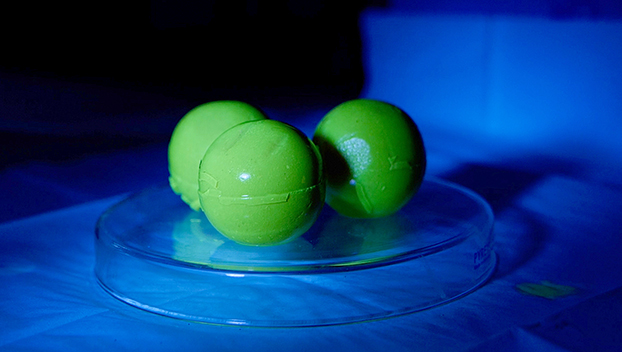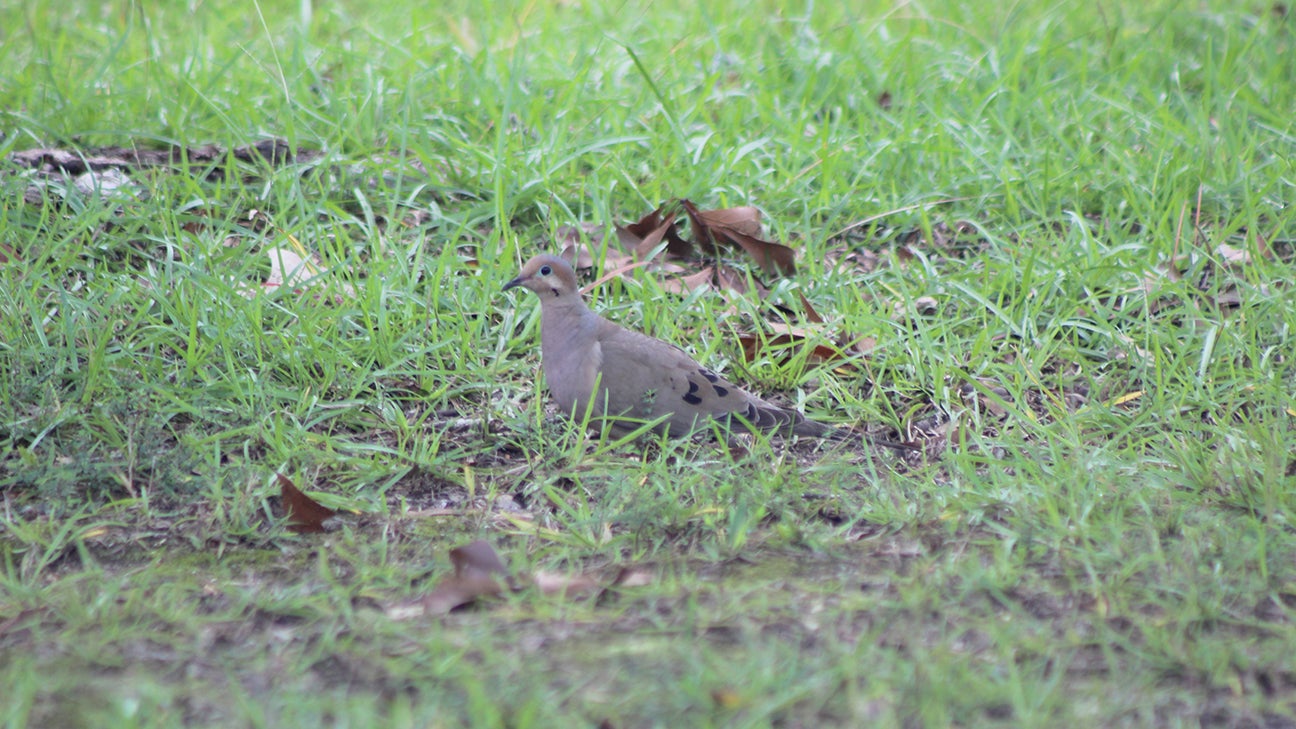Newly patented toxic hog bait to be featured in MDWFP meeting
Published 12:52 pm Thursday, August 10, 2023

- LSU AgCenter scientists are working on a sodium nitrite-based bait to kill feral hogs. The bait has a gummy bear-like texture and is shaped into balls. Newer versions include a fluorescent substance that glows under a blacklight — as seen in this photo — which helps the researchers see whether the bait breaks apart while hogs eat it. So far, the bait seems to stick together well, leaving no crumbs behind.
DURANT — Holmes County State Park will host the Mississippi Department of Wildlife, Fisheries and Parks August commission meeting on Aug. 17. According to the agenda, MDWFP commissioners will hear an educational session on a feral hog toxic bait which recently received a patent.
Glen Gentry with the LSU AgCenter Central Research Station and Jim LaCour, the Louisiana State Wildlife Veterinarian, will present on toxic hog bait as a tool in managing the population. LSU AgCenter was issued a patent Wednesday. LSU’s Department of Chemistry played a role in the invention.
The bait uses sodium nitrite, which is lethal to feral swine, to help fight against a pig invasion. Feral hogs damage crops, wildlife habitat and private property across the country. LSU designed the bait to have a minimal impact on the environment and non-target species. According to LSU, researchers designed the bait to be placed in the ground where hogs had to root for the bait with their tusks to keep deer and other wildlife from eating it.
LSU designed another delivery method to protect Louisiana’s black bear population where remote triggers and cameras can open separate compartments releasing the bait to be consumed by hogs. LaCour said MDWFP was interested in learning more.
“Our commissioners spoke with the MDWFP commissioners about it, and they wanted to hear more about it,” LaCour said. “It would be revolutionary to have another tool in the tool box. It would take less man power and wouldn’t be as intensive. You would get rid of hogs that are shy of traps. The goal is to have something for farmers to use when planting food.”
LSU’s bait could be planted in the ground around the edge of the field so when the hogs tear up the field, they eat the toxic bait first and die. LaCour said their research so far showed the hogs would dig up the bait without any toxicants in them.
Work on the bait took 10 trials and taste tests to find the hogs favorability for bait. LSU found fish meal was the preferred bait, LaCour said. He added they had to make the sodium nitrite stable and reduce the bitter taste. LSU changed the PH levels, reducing the bitterness so hogs would keep eating the bait.
LaCour said the bait has a gummy consistency to prevent any crumbs from being left behind. The US Department of Agriculture is working on a similar toxic bait which is flavored like peanut butter but is having problems with crumbs which could be deadly to non-target animals.
LSU will now progress to field trials, but first they need approval from the Environmental Protection Agency. LaCour said it would cost $500,000 to apply for the EPA experimental use permit. Half a million dollars would be a fraction of $90 million of damage caused by hogs annually in Louisiana.
“Once all of the field work is done on it, the EPA can take three years to review the packet,” LaCour said.
Sodium Nitrite is not toxic to humans and is found in preserved meats such as ham and bacon. Hogs lack the enzyme needed to break sodium nitrite down. The nitrite transforms hemoglobin into methemoglobin which starves the hog of oxygen.
MDWFP’s educational session starts at 11 a.m. August 17 at 5369 State Park Road in Durant. MDWFP will hold its regularly scheduled Business Session afterwards at 1 p.m.
Commissioner Leonard Bentz is set to retake an oath of office after being reappointed by Gov. Tate Reeves to a five year term.
Jason Thompson will present on license sales. Angel Rohnke will give an internship program update. Jerry Brown will present rule proposals for commercial fishing regulations.
Andre Hollis will present a capital improvement update.
Col. Jerry Carter, chief of law enforcement, will present an update on law enforcement and speak about the MDWFP Lawfit Team which competes each year. There are no license reinstatement requests nor public comments on the current agenda.





